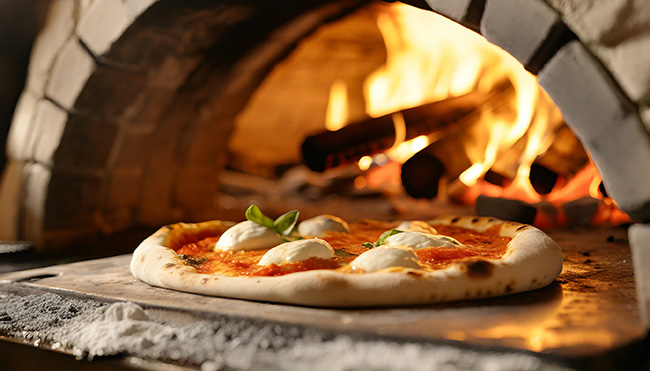Pizza is arguably the most famous Italian dish in the world, loved by people of all ages and cultures. It has become a global phenomenon, with countless pizzerias opening up in every corner of the world. But what exactly makes pizza so special and popular? Here, we will explore the history, flavors, and cultural significance of pizza, and delve into why it has captured the hearts and taste buds of millions around the globe. Get ready to satisfy your pizza cravings and discover why this iconic dish continues to be a favorite for food lovers everywhere.
The history and origin of pizza
To truly understand why pizza is the most famous Italian dish in the world, we need to delve into its rich history and origins. The concept of pizza can be traced back to ancient civilizations such as the Greeks and Egyptians, who made flatbreads topped with various ingredients. However, it was the Italians who truly perfected the art of pizza-making.
The modern pizza as we know it today has its roots in Naples, Italy. In the 18th century, Neapolitan street vendors started selling flatbread topped with tomatoes and cheese, the precursor to the classic Margherita pizza. This simple yet delicious creation quickly gained popularity and spread throughout Italy, becoming a favorite among the working class.
In the late 19th century, Italian immigrants brought pizza to America, where it underwent further transformations and variations. It was in America that the pizza industry truly boomed, with the invention of the pizza oven, delivery service, and the introduction of diverse toppings.
Today, pizza has evolved into a global phenomenon, with countless regional styles and variations. From the thin-crust, wood-fired Neapolitan pizza to the deep-dish Chicago-style pizza, there is a pizza for every taste and preference.
In the next section, we will explore the flavors and toppings that make pizza so versatile and appealing to a wide range of palates. Stay tuned to find out why this iconic Italian dish continues to captivate food lovers around the world.

The versatility of pizza
The versatility of pizza is one of the reasons why it has become such a beloved dish worldwide. Pizza can be customized to suit any palate, making it the perfect choice for anyone craving a delicious and satisfying meal. Whether you prefer a classic Margherita with its simple but flavorful combination of tomato sauce, mozzarella cheese, and fresh basil, or you like to experiment with adventurous toppings like pineapple, barbecue chicken, or even Nutella, there is a pizza out there for you. Additionally, pizza can easily accommodate different dietary preferences and restrictions. Gluten-free crusts and plant-based cheese options have made it possible for everyone to enjoy a slice of this culinary masterpiece. In the following section, we will explore some of the most popular pizza toppings and regional variations that have contributed to the endless possibilities of this timeless dish.
The worldwide popularity of pizza
Pizza’s worldwide popularity can be attributed to several factors. Firstly, its delicious taste and variety of flavors have won over the hearts of people from all corners of the globe. Whether you prefer a thin crust or a thick, doughy base, there is a pizza style that will satisfy your cravings. Moreover, the convenience and accessibility of pizza have played a significant role in its global fame. With the rise of delivery services and the availability of frozen pizza in supermarkets, enjoying a hot slice has never been easier. Lastly, the cultural impact of pizza cannot be underestimated. From movies and TV shows to songs and memes, pizza has become an iconic symbol of indulgence and pleasure. As a result, it has successfully transcended borders and become a universal favorite. In the following section, we will delve into the history of pizza and its journey from the streets of Naples to the world stage.
Pizza’s impact on the economy
Pizza’s popularity goes beyond satisfying cravings and being a cultural symbol of indulgence. It has made a significant impact on the global economy. The pizza industry generates billions of dollars annually, creating jobs and contributing to local economies worldwide. From the farmers who grow the ingredients to the delivery drivers who ensure your pizza arrives piping hot, there is a vast network of individuals involved in the pizza chain. Furthermore, the success of pizza franchises has led to the establishment of countless restaurants, creating job opportunities for cooks, waitstaff, and management personnel. In addition, the pizza industry has sparked innovation in packaging, delivery services, and technology, further stimulating economic growth. So next time you indulge in a slice, remember that you’re contributing to an industry that plays a pivotal role in economies around the globe.
The cultural significance of pizza
Pizza not only holds economic importance, but it also carries immense cultural significance. Across the globe, pizza has become a symbol of Italy and its rich culinary heritage. It has seamlessly integrated into various cultures, adapting to local tastes and preferences. In many countries, pizza has become a staple dish, embraced by people of all ages. Its versatility allows for endless variations, catering to different dietary requirements and personal preferences. Whether it’s the classic Margherita, loaded with toppings, or a creative fusion of flavors, pizza has the power to bring people together, crossing barriers of language and background. Its presence in social gatherings, parties, and even movie nights is a testament to its universal appeal. Through pizza, we not only share a delicious meal but also celebrate the spirit of diversity and togetherness that transcends borders.
Pizza’s enduring legacy
Pizza’s enduring legacy is a testament to its universal appeal and ability to adapt to different cultures and taste preferences. It has truly become the most famous Italian dish in the world, loved by people of all ages and backgrounds. Whether it’s a classic Margherita or a unique fusion creation, pizza has the power to bring people together and celebrate the spirit of diversity and togetherness. Its presence in social gatherings, parties, and movie nights symbolizes its importance as a shared and enjoyable experience. As we continue to indulge in this beloved dish, we are reminded of the rich culinary heritage of Italy and the beauty of cultural exchange. Through pizza, we not only satisfy our taste buds but also connect with others on a global scale. So, next time you reach for a slice, remember that pizza isn’t just food; it’s a celebration of inclusivity and the beauty of cross-cultural connections.










